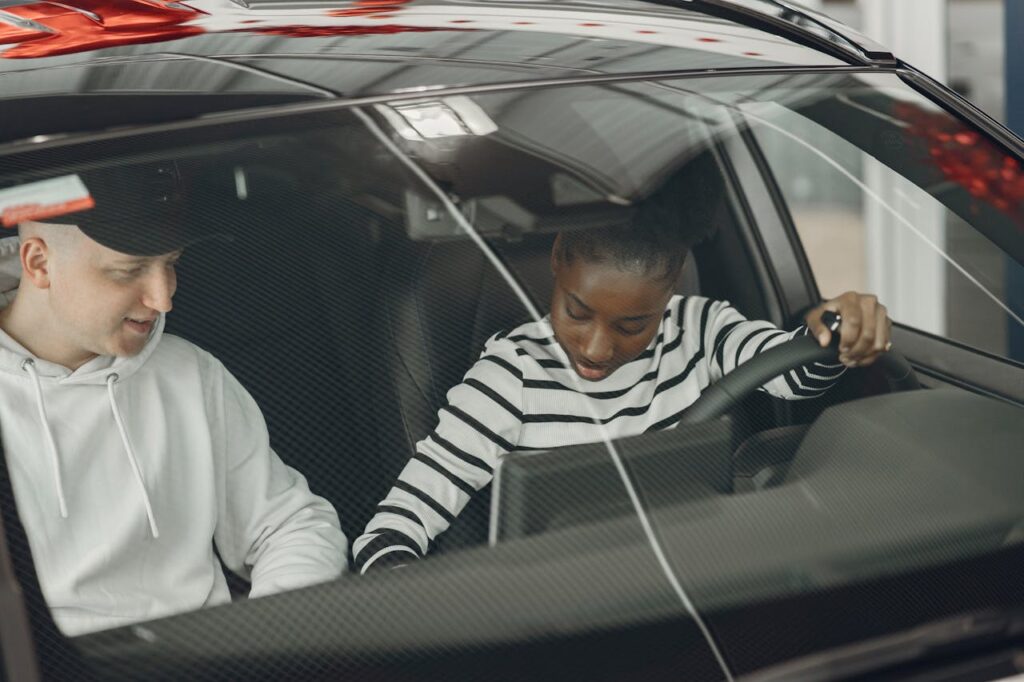Every driver wants to pass their test as soon as possible, and preferably on the first try. Learning to drive is one of life’s most rewarding milestones, but preparing for the big day – the practical driving test – can feel intimidating for first-time drivers. With around 1.6 million people taking the practical driving test each year in the UK, it’s no wonder that nerves can creep in. Having the best preparation and mindset can help you tackle the test and pass on your first try.
At Cars Under £3000, we not only provide cheap and reliable used cars for first-time drivers but also want to see you succeed behind the wheel. Here are our top 10 driving test tips to help you pass with flying colours.
Choose the Right Driving Instructor
The foundation of your driving success starts with choosing a qualified and experienced driving instructor. An Approved Driving Instructor (ADI) is trained to provide expert tuition and is regularly assessed to ensure they meet UK safety and teaching standards.
Look for instructors with positive reviews and recommendations. A patient, encouraging instructor can make all the difference in helping you feel calm and prepared. They’ll teach you proper techniques and provide constructive feedback that is vital for developing your driving skills.
Practice Consistently
Like many skills, driving is an ability that improves with practice. Consistent lessons help you to familiarise yourself with test routes, refine harder manoeuvres, and gain the confidence needed to handle different road situations.
Did you know that lapses in concentration, particularly towards the end of the test, are a leading reason for mistakes? Regular practice builds the mental stamina to stay focused from start to finish. Aim for a mix of practice sessions with your instructor and additional driving time with a supervising driver, where possible.

Be Confident, Not Overconfident
Confidence is key, but overconfidence can lead to risky errors. While experienced drivers may feel self-assured about their skills, the driving test requires strict adherence to the rules. Misjudging speed limits, failing to check mirrors, or cutting corners can lead to avoidable faults.
Stay calm, focus on your training, and approach the test with a balanced mindset. Confidence paired with caution is the recipe for success.
Master the “Show Me, Tell Me” Questions
Before the driving test begins, the examiner will ask one ‘tell me’ question, and during the test, you’ll be asked a ‘show me’ question. These are designed to assess your understanding of vehicle safety.
Common questions include:
- “Tell me how you’d check the engine oil level.”
- “Explain how to check brakes are working before starting a journey”
- “Show how to set rear and front demister”
- “Show me how to use the windscreen wipers.”
Knowing these inside out will put you at ease and score you some early points. Review the DVSA’s list of potential questions and practice them before test day.
Check Your Mirrors
One of the most common reasons candidates fail their driving tests is insufficient mirror checks. Examiners pay close attention to whether you check your mirrors regularly and at the right times – for example, before changing lanes or approaching junctions.
Make it a habit to check your mirrors frequently and obviously, not only for the test but for safe driving in general. Proper mirror usage shows awareness of your surroundings, a critical skill for passing the test.
Conduct Mock Tests
A mock driving test replicates the real thing and is one of the best ways to prepare. Ask your instructor to conduct a mock test under test-like conditions. This will help you to pinpoint areas for improvement and reduce anxiety by familiarising you with the process.
Mock tests also give you a feel for how to handle nerves and stay focused under pressure – valuable practice for the test day itself.
Practice Driving in Different Conditions
Driving in varied weather conditions helps you build confidence and the ability to adapt to your surroundings. For example:
- Rain: Learn how to adjust your speed and braking distance.
- Fog: Practice using fog lights and maintaining safe visibility.
- Winter: Understand how to handle icy roads safely.
Choosing the right season for your test is also important. If you’re comfortable driving in mild conditions, aim for spring or summer, when the weather tends to be more predictable.
Monitor Speed Limits and Road Signs
Examiners are particularly vigilant about how well candidates observe speed limits and road signs. Driving too fast or too slow is a common reason for test failures.
Stay alert, read every sign, and keep a close eye on your speedometer. Adjusting your speed for school zones, pedestrian crossings, or sharp bends will demonstrate your ability to drive safely and responsibly.
Choose Your Test Day Wisely
Did you know that the time and day of your driving test can impact your chances of success? Statistics show that weekday tests, particularly on Tuesdays, tend to have higher pass rates, possibly due to light traffic and a more focused mindset after the weekend.
Early morning slots (7 a.m. to 9 a.m.) often have quieter roads, while mid-morning tests (9 a.m. to 11 a.m.) avoid the rush-hour traffic. Discuss the best option with your instructor to optimise your test conditions.
Practice Different Manoeuvres
Since December 2017, the DVSA has updated the test to include real-world manoeuvres such as:
- Parallel parking
- Reversing into a bay
- Pulling up on the right-hand side of the road
Make sure you’re comfortable with these tasks, as they are likely to be tested. Practising manoeuvres repeatedly ensures you know how to execute them confidently, even under pressure.
Bonus Tip: Stay Calm on Test Day
On the big day, aim to arrive at the test centre early to settle your nerves. Take deep breaths, focus on your preparation, and trust in your ability.
Remember, minor faults are allowed (up to 15), so don’t panic if you make a small mistake. Stay focused on the road ahead, and don’t let one slip-up ruin your test.
Your Next Step After Passing: Find a Reliable First Car
Passing your driving test is just the beginning of your journey. Once you’ve earned your licence, finding a reliable car is the next step. At Cars Under £3000, we specialise in affordable and dependable used cars in Essex, perfect for first-time drivers.
We understand that buying your first car is exciting. That’s why we make the process simple and enjoyable, offering a wide range of cars to suit every budget. Whether you’re after something economical or stylish, we’ve got something for you.
By following these driving test tips, you’ll not only boost your chances of passing on the first try, but also develop safe driving habits for life. And when it’s time to hit the road, Cars Under £3000 will be here to help you get started.

